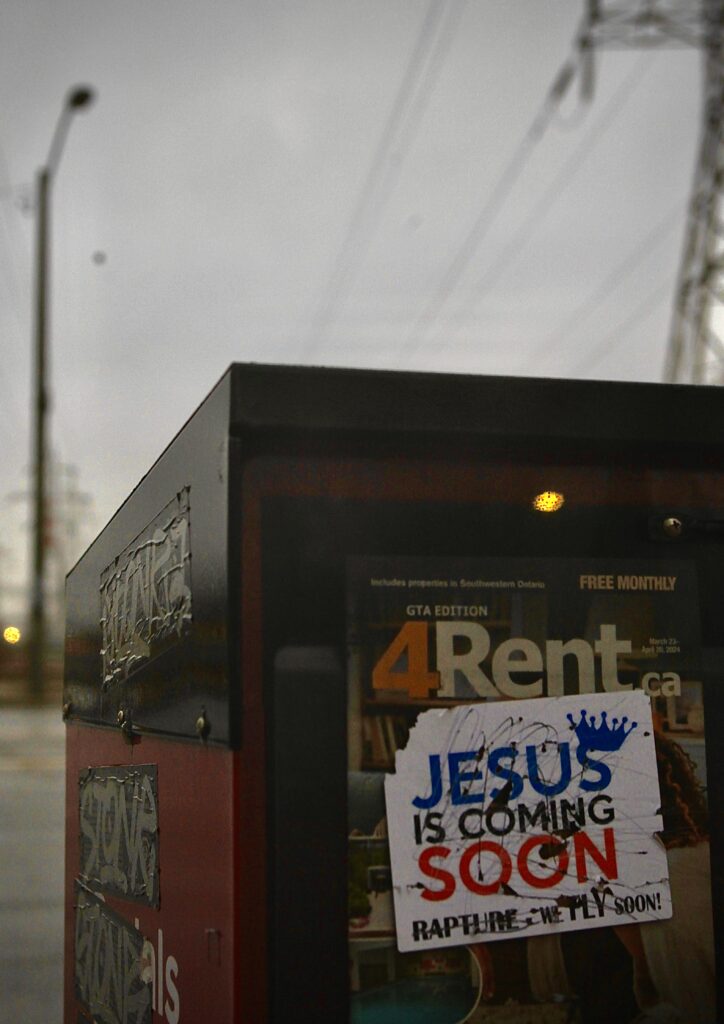By Luna Saetang
It is a drill that digs into your ears, a dusty mist that forms its own entity along every road, the fumes of cement polluting every breath. It is collapsing structures and rumbling so loud you would think it’s coming from the sky.
In Toronto, it is.
Islington City-Centre lives as a quiet neighbourhood, as west as you get before Mississauga, Ont. In a landscape of family businesses and bungalows, one condominium towers 40 storeys above. The newly constructed Station Place – a “prestige rental property” as described on their website – glares down with grey monotony.
Six Points Plaza – simply known as Six Points to locals – has sat opposite the condo site for decades, the corner of Dundas Street West and Aukland Road. It wasn’t until the 2020 decade began that surrounding businesses such as Apache Burgers, Six Points Dollar and Glenny’s Family Dental were introduced to the looming threat of demolition.
Three years ago, news broke in the local paper that the plaza would be redeveloped into a six-condominium hub. Online forums on Urban Toronto showcase a strong online opposition to the project. Community resistance is evident in comments such as, “How dismal,” and “Well, so much for supporting small businesses.”
In 2022, the Ontario government addressed housing stock storages by enacting the More Homes, Built Faster Act (Bill 23). Among its 50 initiatives, key priorities include constructing homes near transit hubs and expediting construction approvals. In 2023, the province saw a 25 per cent rise in approved large-value permits (condominiums), as reported by Statistics Canada.
On the surface, the Etobicoke-Lakeshore ward seems ideal for housing redevelopment, situated along Toronto Transit Commission’s (TTC) Line 2, extending the lucrative downtown culture westward. However, in 2024, condo sales in Toronto hit record lows, primarily due to affordability issues, including escalating interest rates.
Islington City-Centre: Proposed Rezoning and Site Plans
In 2009, Mike Ali saw his light of opportunity tucked between a dying Blockbuster and a family restaurant that hadn’t changed since the 1960s. When he gave all his savings to flip a failing business, it wasn’t the most untraditional post-grad plan. Fourteen years later, no one could have predicted what a neighbourhood staple his dollar store inside Six Points would become.
Playing at the store’s front counter, Ali’s young daughter was sad to see the family-favourite stuffed panda sell. With that, it’s hard to imagine what turmoil a vacate notice will bring.
“You have no control. Commercial real estate is more like the wild, wild west,” Ali said.
A similar situation happened to his parent’s business, their landlord forced them out of a lease after three decades of operation. Shutdown, they now help him at Six Points Dollar. “But imagine at that point in a couple years, they’re not even going to have a job. They’re going to be too old to go work out there,” he said about his store’s impending closure.
Left to invest in a new life plan, Ali transitioned into real estate.
“If you can’t beat ‘em, join ‘em,” he said.
As an agent, he said he even expects to be showing some of the new neighbourhood units when they are constructed. This realization is more bitter than sweet to him.
Behind Six Points, Anne Bicci is actually open to selling. Growing with the business since her father opened in 1969, she owns the property of Apache Burgers. In February, she returned from “the first vacation that I’ve ever been on, where I didn’t run into at least one customer.” Whether it’s Hawaii, Puerto Rico, Aruba or even in the airport, she’ll always hear someone yell, ‘Apache!’
In 2024, it was also the first time she had attained a law firm to protect her business. Despite having loyal customers from all walks of life, there have been a few in recent years with stranger propositions than lunch.

The first time a developer offered her a deal was in the spring of 2021. She claims it was for $3.5 million, and she declined. This was in consideration of Dundas Street Grille, the adjacent restaurant, allegedly selling for nine times more.
Weeks later, the developer came back with the same number. Awestruck, she didn’t understand what wasn’t clear the first time. Bicci knows her land is smaller, but it just wasn’t a decent number to her.
A few months later, a different developer came in and handed her a business card. Bicci remembers the man explained that he was a small developer, part of a group that liked her site.
“We’re prepared to offer you $9 million,” Bicci recalls him saying.
Despite a $100 thousand deposit cheque, something didn’t feel right. Bicci’s old testament is to always go with your instincts. After consulting her lawyer, she discovered the offer included six months due diligence (not allowed to accept any higher offers). In that time period, the developer could withdraw if plans fell through, entitled to the $100 thousand back. She called the developer and said, “I’ll tell you what. You make that deposit non-refundable and we have a deal.”
Bicci never saw him again.
In March of this year, she said a registered letter from the Six Points developer was delivered to her. Outlining her property line, it was a notice explaining they are going to build a wall surrounding her restaurant. To Bicci, this signalled an attempt to box her in and make her spot inaccessible from Dundas Street, a real estate term known as landlocking. For her business, this means no more parking space. For customers, this means no more vintage car meets on the lot, a residential tradition.
Apache Burgers has seen children grow up to bring their children. Bicci believes that when condos go up, that will change. She described the students she employs, whose parents won’t be able to afford living there anymore. Neither, her son’s children one day.
“We’re going to drive everybody out of the city and just leave it for those who can afford it? That’s not the Toronto I was born in,” she said.

In the days when Eglinton was a gravel road and ponies frolicked in backyards, Glenny’s Family Dental opened practice. Growing up amidst the Six Points neighbourhood, Dr. John Glenny, and his sister, Dr. Sarah Dundas, eventually inherited the practice from their father. Upstairs is used for storage, but remnants of the ’60s paint cling to the walls as a nostalgic reminder of when their office was their childhood home. Aside from the sentiment, there is a certain luxury that comes from having autonomy as a business. Proven true during the COVID-19 pandemic, ventilation was a problem. They could, literally, rip a hole into the wall if they needed to.
“How do you do that in a condo tower?” said Glenny.
In May 2023, they received an offer that “wasn’t insanely high, considering what we would have to go through,” he said. Transporting dental equipment is expensive, nevermind the financial risk of the 24 month vendor take back clause. Meaning if he agreed to the deal, he would need a loan from the bank to secure a new location. Before May 2025, there is a chance the developer could withdraw, leaving Glenny with two properties and debt. Any new location in the area is also under threat of demolition, risking the need to move again down the road.
Most importantly, a majority of their patients are fourth generation.
“Could I retire tomorrow? Probably. But I would miss all of these people here,” Glenny said.
Dundas is heartbroken about what’s happening to the neighbourhood. She said there is already an issue with garbage collection, noise pollution, power outages and gridlock.
She sees the Station Place condo as a “scary” example of what they are soon to be surrounded by: “just a giant shadow.”
In Islington City Centre, family businesses have proven their endurance through Ali, Bicci and the Glennys. In the context of urban-planning, the sky’s the limit. But what, if not the dollar amount, determines the true sovereignty over a turf?
For her property, Bicci declared what she will tell anybody now, “Before I give it away to a developer, I’ll give it to my son.”
